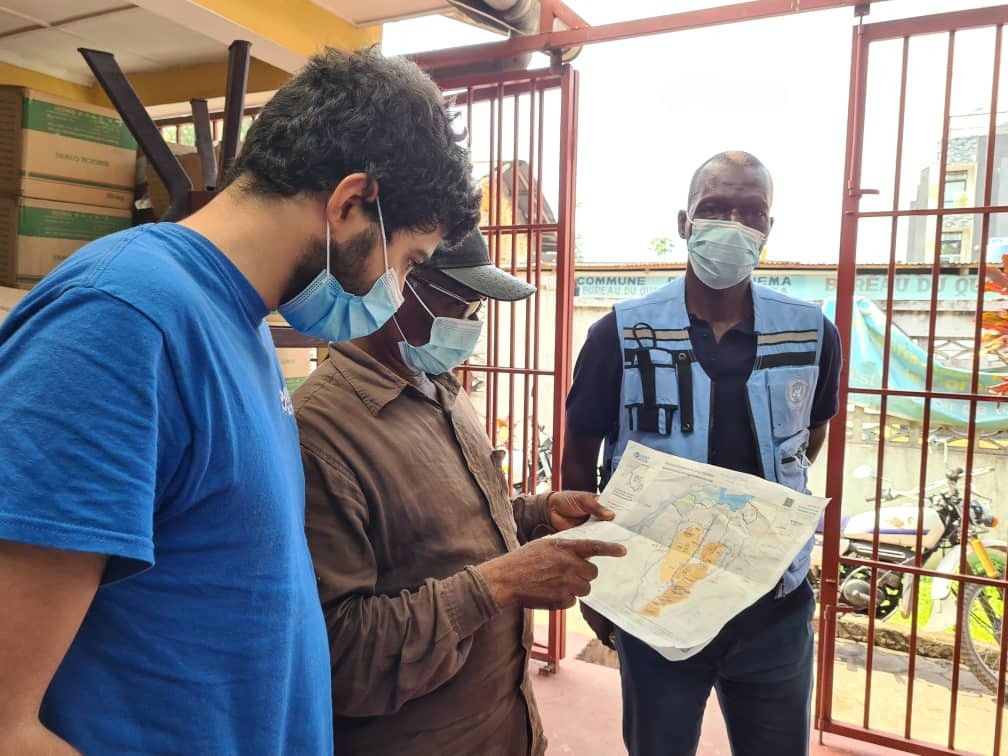Health

MapAction continues to increase its focus on global health in 2024.
Whether it’s deploying data and GIS tools to fight malaria in Burundi, cholera in Malawi, Ebola in Sierra Leone & Liberia, or dengue in the Philippines, for more than a decade MapAction has supported the planning and delivery of public health campaigns and outbreak responses worldwide.
Good data underpins effective health panning. That is why MapAction continues to increase its focus as an organisation on public health, from West Africa to the Philippines, via Burundi, Malawi and the Horn of Africa.
COVID-19 accelerated this focus. A pilot in South Sudan in 2021, to prepare geospatial and population data to support final mile roll-out of COVID vaccination programmes, led to development of the Integrated Humanitarian Data Package (IHDP).
Reaching the ‘Unreached’ with UNICEF and CartONG
As of 2023, MapAction is working with UNICEF and humanitarian GIS specialists CartONG, to help health ministries, and their supporting partners, to make data-informed decisions to vaccinate children and ensure the necessary lifelong health assistance in six African countries. Africa is home to 91 million children under the age of 5 without a birth certificate, according to UNICEF data. These children cannot get access to healthcare and social services: vaccination campaigns fail to include them because they are not accounted for in census data.
UNICEF aims to provide the six countries – Mali, Côte d’Ivoire, Cameroon, Chad, Nigeria and Guinea – with spatial data and GIS tools, namely maps and dashboards. This will enable local authorities and stakeholders to locate “unreached” children and to help with surveillance and advocacy; by providing evidence-based information to assist in decision-making for improving health planning, immunisation and birth registration.
READ ALSO: Putting children on the map in West and Central Africa through geo-spatial analysis
Vaccine-delivery innovation
The IHDP tool seeks to address a key challenge: how to plan a health campaign where data is missing or incomplete. The IHDP is designed for data-scarce environments and provides organisations engaged in vaccine or service delivery with a useful tool to help them identify and fill these key data gaps. The aim is to give quick and easy access to key geographic data that underpins the planning and delivery of vaccination programmes,. This kind of support to decision-makers helps to save lives.
READ ALSO: South Sudan data package to support effective and equitable Covid vaccine delivery
Versions of the IHDP have since been trialled or adapted in other African public health spheres: for example, to support government anti-malaria campaigns in Burundi. The IHDP also informed MapAction’s contribution to a cholera containment project in Malawi in 2023.
Scalable solutions
The potential for further scale is multifold. According to MapAction partner the World Health Organisation (WHO), “the global health and medical applications of GIS are numerous and many countries currently lack the benefits of GIS to strengthen their health information system.” Timely and reliable decisions can save lives. Those decisions depend on good data. MapAction and the WHO signed an MoU, for MapAction to provide immediate geospatial support to future health emergencies. .
READ ALSO: MapAction signs WHO partnership agreement underlining growing support for health emergencies
“Data is key”
MapAction remains committed to scaling its health work, with UNICEF and others, as well as evolving and sharing its IHDP tool. “High quality mapping and data analysis are key to understanding how many people need vaccinating, where they are, and how and where the vaccines can be safely stored and delivered,” says Nick McWilliam, who worked on the IHDP for MapAction. “We know that access to good data is a major issue in many countries. Even where data exists, it’s frequently patchy and not in a format that is usable by most people, as well as lacking crucial information about the local context. The IHDP concept is intended to remove barriers to good information that are otherwise likely to hinder vaccine delivery.”
Future vision
MapAction envisions a health program that seamlessly integrates cutting-edge geospatial technologies and innovative solutions to provide swift and reliable health information. By expanding geographic reach and fostering collaborative partnerships, the organisation aims to address health disparities in vulnerable regions, extending the impact of its health programme to underserved areas.
The commitment to continuous program evaluation ensures adaptability and refinement, while a focus on sustainable health solutions emphasises long-term resilience in collaboration with local communities and health authorities.
Through capacity building, training initiatives, and a culture of innovation, MapAction sees an opportunity to use the huge body of geospatial skills and knowledge it has acquired in over 20 years of humanitarian response, to enhance health work, both in times of crises, and not. Our work so far has been met with enthusiasm and demand for more. As new resources become available, we seek to provide ever more health support.
For partnerships
(EN) MapAction works with disaster management authorities and networks worldwide to strengthen data quality and humanitarian information management preparedness. If you would like to discuss a potential partnership, please contact our Head of Programmes and Partnerships Marina Kobzeva: mkobzeva@mapaction.org
(FR) MapAction travaille avec les autorités et les réseaux de gestion des catastrophes dans différentes parties du monde pour renforcer la qualité des données et la préparation à la GI humanitaire. Si vous souhaitez discuter d’un partenariat potentiel, veuillez contacter notre responsable des programmes et des partenariats Marina Kobzeva: mkobzeva@mapaction.org
(PT) A MapAction trabalha com autoridades e redes de gestão de desastres em diferentes partes do mundo para fortalecer a qualidade dos dados e a preparação para a gestão da informação humanitária. Para discutir uma possível parceria, entre em contato com nossa Chefe de Programas e Parcerias, Marina Kobzeva: mkobzeva@mapaction.org
MapAction’s work in health is supported by UNICEF and the Calleva Foundation.
